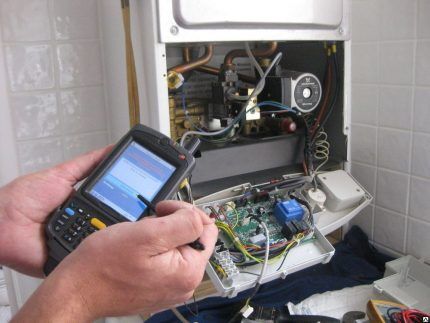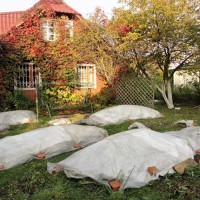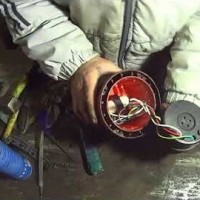How to reduce the power of a gas boiler: the best options to reduce gas consumption by the boiler
The cost of energy resources is growing with enviable regularity, so whether you like it or not, you have to think about how to reduce the power of a gas boiler in order to save money. After all, overpaying for “blue” fuel is impractical, unprofitable, and simply unreasonable. Do you agree?
Moreover, in many cases it is not difficult to save gas, and along with it money. Read more about how to do this in our publication.
The content of the article:
The simplest ways to reduce power
The simplest and most effective, as well as operational methods that help save gas and reduce power include adjusting the boiler settings. Using them you can reduce consumption by a quarter.
These methods of reducing power include:
- adjusting settings in manual mode;
- power adjustment in automatic mode.
Both options can be used separately or together. Which will help increase the energy efficiency of any heating device to the optimal value.
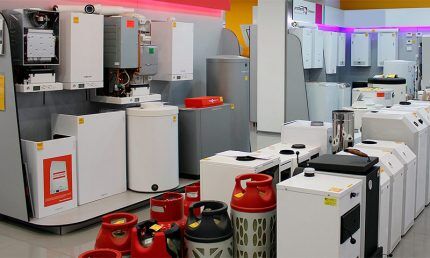
Method #1 - manual adjustment
This is the most inexpensive and fastest method of making adjustments to the operating mode of your gas boiler. Since the whole procedure is reminiscent of reducing the volume of the TV sound.
After all, all you need to do is perform 2 simple steps:
- Enter boiler service menu (not to be confused with regular user). What can you do after entering a special code? You can find it out from the manufacturer, supplier, seller, service centers and many other ways;
- By clicking the “—” button set the desired power value.
An important advantage of the described method for reducing gas consumption is its simplicity. Since almost any boiler user can cope with the task. We recommend that you read gas flow measurement methods.
The disadvantage is that when the boiler power decreases, its efficiency decreases. As a result, if the adjustments are changed downward by a moderate amount, it will be a reasonable compromise. Which will help you benefit from fuel economy.
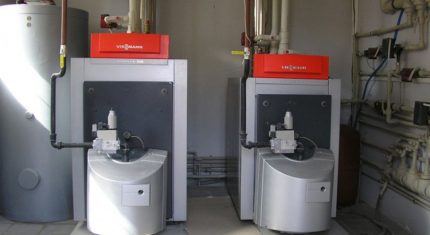
In the same way eliminate impulse work boiler (its clocking). Which is a common cause of excessive energy consumption.
At the same time, if you make an excessive reduction in the productivity of gas equipment (from maximum to minimum), the decrease in efficiency will be expressed in tens of percent from the optimal value. Which, again, will lead to additional and unnecessary costs.
Method #2 - automatic adjustment
It is cost-effective and efficient to adjust the power of gas boilers using the so-called weather-dependent automation. Its peculiarity is that the delivery set includes external and internal temperature sensors. That is, when choosing the optimal operating mode, the indicators obtained from measurements outdoors and inside heated rooms are taken into account, or rather compared. This allows you to change the boiler power even before the air in the rooms overheats.
Example: with the onset of morning, the frost outside subsides, but at the initial stages of warming, internal sensors do not record temperature changes. Therefore, the boiler continues to operate at constant output. But after a couple of hours, this will lead to overheating of the indoor air, which means some of the gas will be wasted.
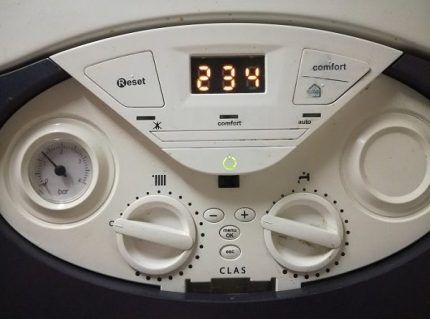
At the same time, the use of an external temperature sensor will ensure that an increase in temperature is detected in a timely manner. This will allow you to reduce the boiler power in advance.That is, the air will not overheat. And this will ensure more economical gas consumption.
Manufacturers produce weather-dependent automation kits for most of their modern boilers. But in most cases it is not included in the basic package. That is, if necessary, the specified equipment will have to be purchased.

Both adjustment methods described above are quite effective. But you should know that the maximum benefit from them will only be if the gas boiler, as well as related equipment (for example, ventilation, smoke removal, etc.) is correctly selected, technically serviceable and operates in normal mode.
Otherwise, the use of adjustments will simply mask the existing problem. And to solve it we have to look for other ways.
Effective methods to reduce gas consumption
Reasons that significantly influence reduction in efficiency of gas boilers, and, accordingly, an increase in fuel consumption, quite a lot. Therefore, the user should initially identify the one that negatively affects the performance of gas equipment. In order not to experiment, using the “trial and error” method to reduce power.
Moreover, often all that is needed to identify a problem that prevents the boiler from operating in optimal mode is to conduct a visual inspection of it.What can be done in a matter of minutes by both an employee of a gas service, a specialized company, and a person who has only a basic set of special knowledge.
And after identifying the problem, you should choose one of the suitable options for eliminating it. Which we will look at in detail below.
Method #1 - eliminating the causes of chemical underburning
Such important structural elements of any heating device, such as a heat exchanger and burner, are often covered with soot, caked dust and other types of contaminants.
As a result, there is a decrease in heat transfer efficiency. Therefore, in order to reach the set temperatures, the gas boiler has to operate for a longer time. Which leads to increased energy consumption.
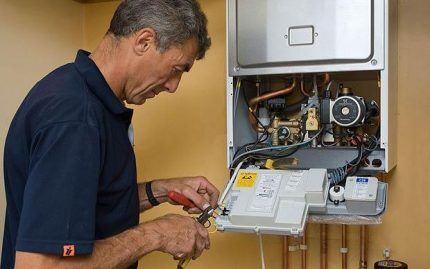
The cause of clogging of the structural elements of a gas boiler is underburning of the “blue” fuel. This phenomenon occurs when insufficient air enters the combustion chamber of the heating device. The result is incomplete combustion of gas.
Troubleshooting occurs in several stages:
- Removing carbon deposits from heat exchanger surfaces, gas burner and other boiler design elements.
- Cleaning ventilation ducts. Moreover, this is a mandatory procedure. Since it is the inefficiency of the ventilation system that often leads to the fact that insufficient air is supplied to the gas burner.
- Cleaning the channels of the smoke removal system. This procedure is necessary because ineffective removal of combustion products can lead to a lack of oxygen.
These manipulations can be performed by gas service specialists, specialized companies, as well as the boiler owner himself. But provided that he has sufficient knowledge and skills.
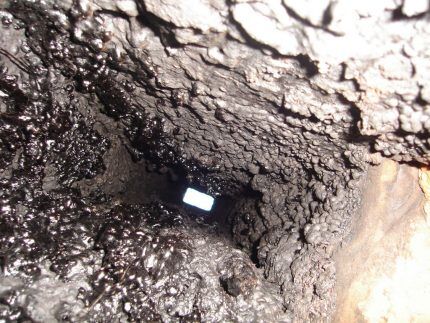
If the boiler structural elements and air ducts are cleaned, but carbon deposits continue to form, and very quickly, then the problem of under-burning and inefficiency can be solved with the help of:
- performing commissioning works;
- arrangement of ventilation and smoke removal systems.
Since adjustment work is simpler and less expensive, you need to start with them. Why do you need to invite a gas specialist or a company that has the necessary license?
Arrangement ventilation systems, smoke removal begins with performing calculations. They allow you to understand how much air is needed to eradicate such a phenomenon as under-burning with subsequent excess gas consumption.
To ensure a stable supply of the boiler with the required amount of air, it is better to use modern equipment (coaxial or sandwich ducts).
Method #2 - eliminating the causes of mechanical underburning
This phenomenon occurs when part of the gas simply does not have time to burn due to excess oxygen, while the surfaces of the boiler remain clean.
That is, the situation is opposite to what happens with chemical underburning.And it is caused by the excessive performance of the smoke removal system, which leads to high draft. Which should be adjusted to eliminate the causes of incomplete combustion of “blue” fuel. Which, with a draft limiter, can be done in a matter of seconds.
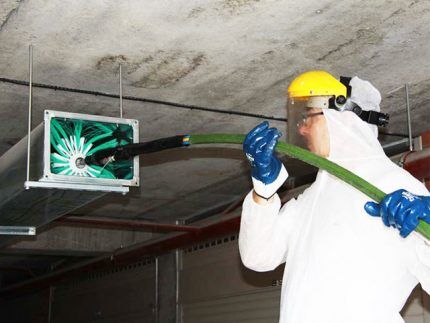
If the specified device is not provided, then when using modern modular smoke removal systems, this deficiency can be easily corrected.
To solve problems with excessive draft, you can think about changing the type of smoke removal system, for example, to modern coaxial ducts with the required diameter. This will be a practical solution - optimal dimensions and the absence of a limiter, which is a transverse partition, will make the air flow more stable. What will affect the quality of gas combustion?
In addition, the reasons for mechanical underburning, and, consequently, excessive gas consumption, can be:
- incorrect power setting;
- incorrect choice gas boiler by power.
In the first case, you can fix the problem by setting the heater manually. How to do this is described at the beginning of the article.
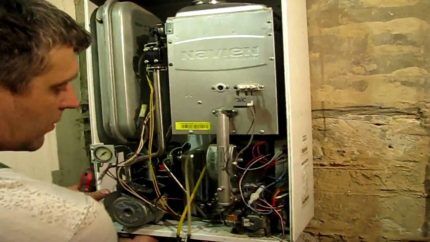
Method #3 - cleaning the heat exchanger and coolant
A coating consisting of ferric iron, salt deposits and other foreign particles is deposited on the internal surfaces of the channels of the specified boiler structural element. Within a few months from the start of operation, this can lead to the fact that more thermal energy will have to be spent to heat the coolant to the required temperature. The production of which will require increased gas consumption.
Even when installing a gas boiler, care should be taken to carry out the commissioning work correctly. Since a poorly configured fuel valve, injector or electronics will not give the expected result. Moreover, from the first day of using the heating device, to eliminate this drawback, the internal cavities of the heat exchanger must be cleaned regularly.
What can be done in different ways:
- mechanical, that is, manual cleaning;
- chemicalwhat special solutions are used for;
- hydrodynamic, which is done using ordinary water (under pressure).
Mechanical cleaning The heat exchanger is made using various brushes and scrapers. That is, with certain skills, you can perform this procedure yourself, although it is labor-intensive.
Chemical way cleaning consists in connecting a special device called a booster to the dismantled heat exchanger. And it repeatedly flushes the internal channels with special liquids (acids). Which cope with even the most persistent plaque.
Hydrodynamic way is the least labor intensive. Since all that is required when using it is to connect a special pump to the heating system.After that, clean water is pumped into its channels, the pressure of which gradually increases. Which leads to delamination and subsequent removal of plaque.
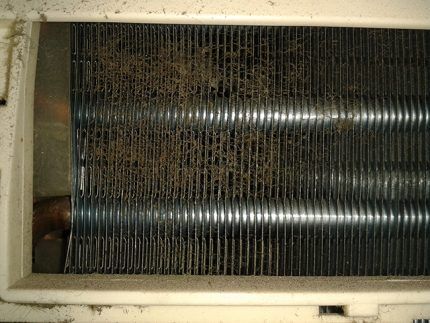
The heat exchanger channels must be cleaned at least once every 2 years. It is possible to reduce the frequency of performing this procedure only by using filters that are used to clean the coolant from all kinds of dirt particles. This allows you to clean the heat exchanger 2 times less often, that is, once every 4 years.
To clean the coolant, you can use filters:
- rough cleaning;
- fine cleaning;
- magnetic.
All of the listed products can be used both together and separately. But the optimal combination of filters can be established only after laboratory analysis of the water that will be used as a coolant.
Method #4 - reducing overall heat loss
If a gas boiler consumes a disproportionate amount of gas, but there are no external signs of a problem and it is configured correctly, then we can assume that the problem is not in the unit itself. And it's all to blame total heat loss, which will have to be eliminated. Otherwise, excess energy consumption cannot be avoided.
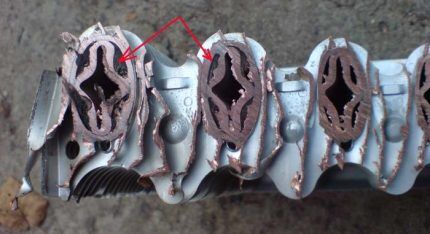
The causes of general heat loss are:
- incorrect installation of radiators;
- suboptimal total thermal power of radiators;
- poor thermal insulation of doors and windows;
- lack of insulation of floors, roofs, walls of the building;
- insufficient thermal insulation of ventilation, smoke removal, etc. ducts.
You should know that the efficiency of any gas boiler directly depends on the correct operation of the radiators. And the worst news is that it will not be possible to reduce energy consumption by any manipulations with the heating boiler if the radiators are installed incorrectly.
Therefore, you need to move on to this issue as soon as it is determined that the boiler is working and correctly configured.
When checking the correct installation of radiators, you must make sure that:
- No distortions. This is an important point, since a radiator tilt of more than 1° begins to affect the efficiency of the heating system. And significant inaccuracies made during the installation of several products will lead to a significant loss of efficiency, by tens of percent;
- The batteries are located in places where heat loss is usually greatest (for example, near windows). And they are placed 12 cm from the floor, 2 cm from the wall and 10 cm from the window sill, which should cover the radiator by 2/3.
You should also pay attention to the absence of excessive bends in the places where the pipes through which the coolant flows turn, and to the correct installation venting valves.
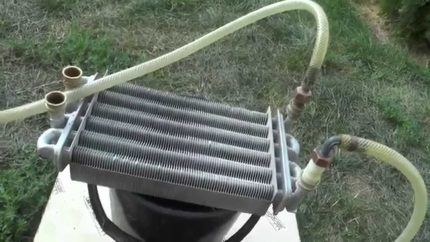
As already indicated, the total thermal power of the radiators and the gas boiler used should be approximately equal.
If you do not follow this rule, then at low total power the gas boiler will heat the coolant to a critical 75 °C. At which rapid wear of the resource of all structural elements of the heating system made of polymer plastics will begin. What threatens leaks.
In addition, at this temperature, dust particles burn en masse, which does not contribute to the comfort of living.
And the worst thing is that the difference in the performance of the equipment that is used as part of the heating system will lead to clocking (frequent switching on/off). In which a considerable part of the gas will simply fly out into the pipe without burning. The reason is that the electronics of all boilers are programmed so that gas is supplied first, and after a while a spark is produced.
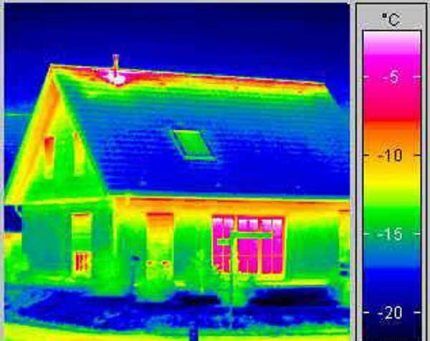
In addition, when turned on, the performance of gas boilers traditionally reaches peak values, which is designed to eliminate problems when igniting them. And this feature with frequent launches leads to even greater losses.
It should also be remembered that gas boilers cannot operate efficiently in a room equipped with windows, doors with slits, cracks and uninsulated walls, floors and ceilings. That is, the listed shortcomings should also be eliminated.
The importance of boiler maintenance
Listed above are effective methods that allow you to solve such a problem as reducing gas consumption by the boiler. But they all have an unpleasant feature. The reason is that the described procedures are used when the heating unit, and with it the entire heating system, has become less efficient. Which leads to increased fuel (gas) consumption and decreased living comfort.
And such a drawback can only be eliminated with the help of maintenance. The main feature of which is the ability to prevent an increase in gas consumption, as well as prevent premature wear of the structural elements of any gas boiler. Which allows you to save even more.

This procedure is a complex of various works, namely:
- control;
- checks.
Which allow you to timely identify signs of all problems leading to a decrease in the efficiency of boilers. The only exception is clogging of the heat exchanger channels, since it cannot be visually identified. Therefore, in this case you just need to combine cleaning work with technical maintenance (with the required frequency).
Maintenance must be performed at least once a year before the start of the heating season. But it is more practical to carry out maintenance up to 3 times every 12 months:
- before the start of seasonal operation;
- during its operation;
- after the end of the heating season.
An important advantage of boiler maintenance is that a significant part of the work can be carried out by the owner himself. Since all that is needed for this is to have a certain set of knowledge and practical experience.
Conclusions and useful video on the topic
The first video material will allow you to better understand the reasons that lead to excessive energy consumption by the boiler.
The following video talks about how to reduce the consumption of “blue” fuel to a minimum.
It is quite possible to reduce gas consumption by a household boiler, and in many cases this can be done quickly and without financial costs. But remember that the most effective method is regular maintenance.
In addition, when performing any work on gas equipment, you should not forget about security measures.
Would you like to supplement our material with useful comments or tell your secrets for reducing gas consumption? Or do you still have questions about reducing fuel consumption with a gas boiler? Add your comments, ask for advice from our experts and other site visitors - the feedback block is located below the article.
